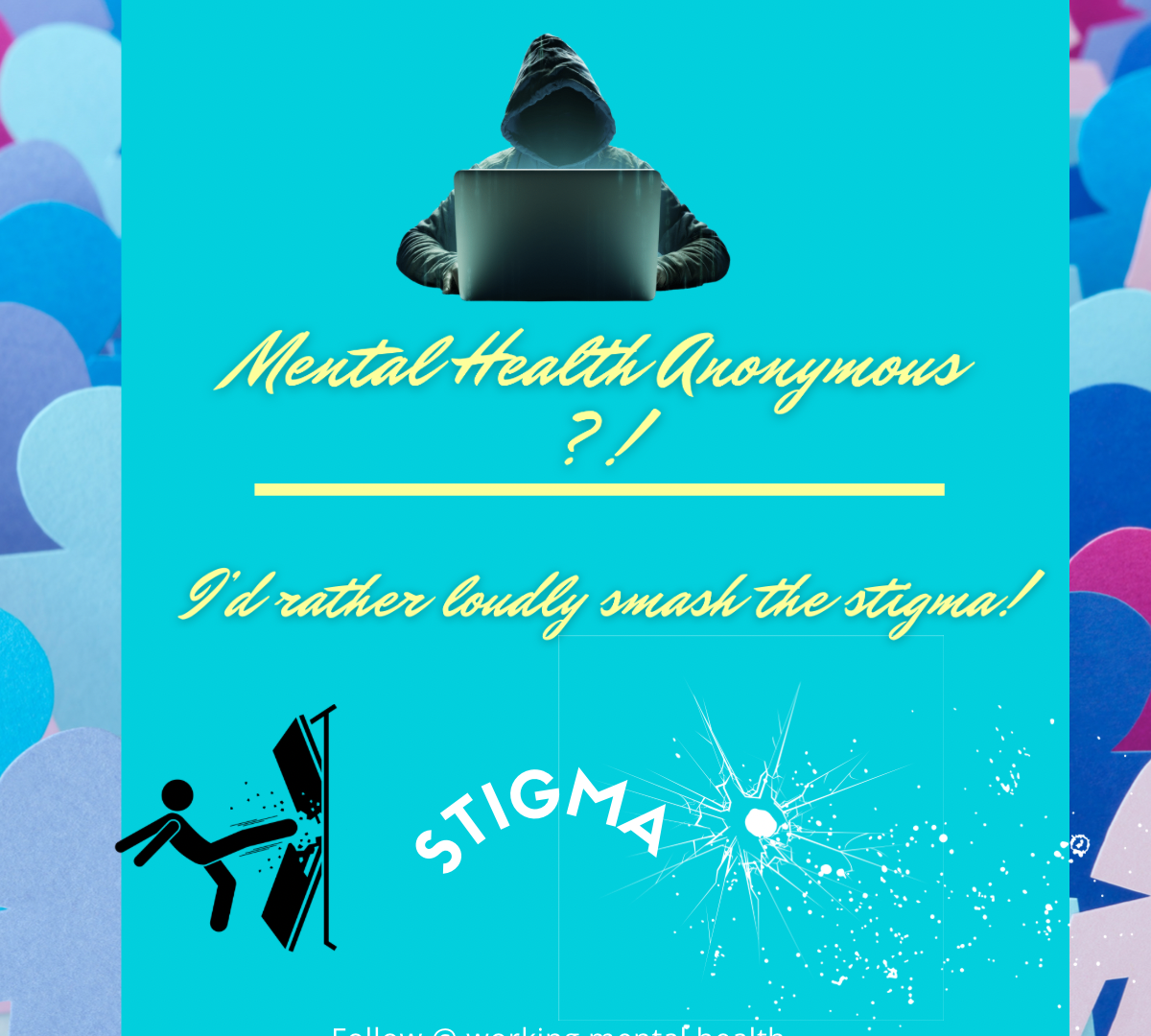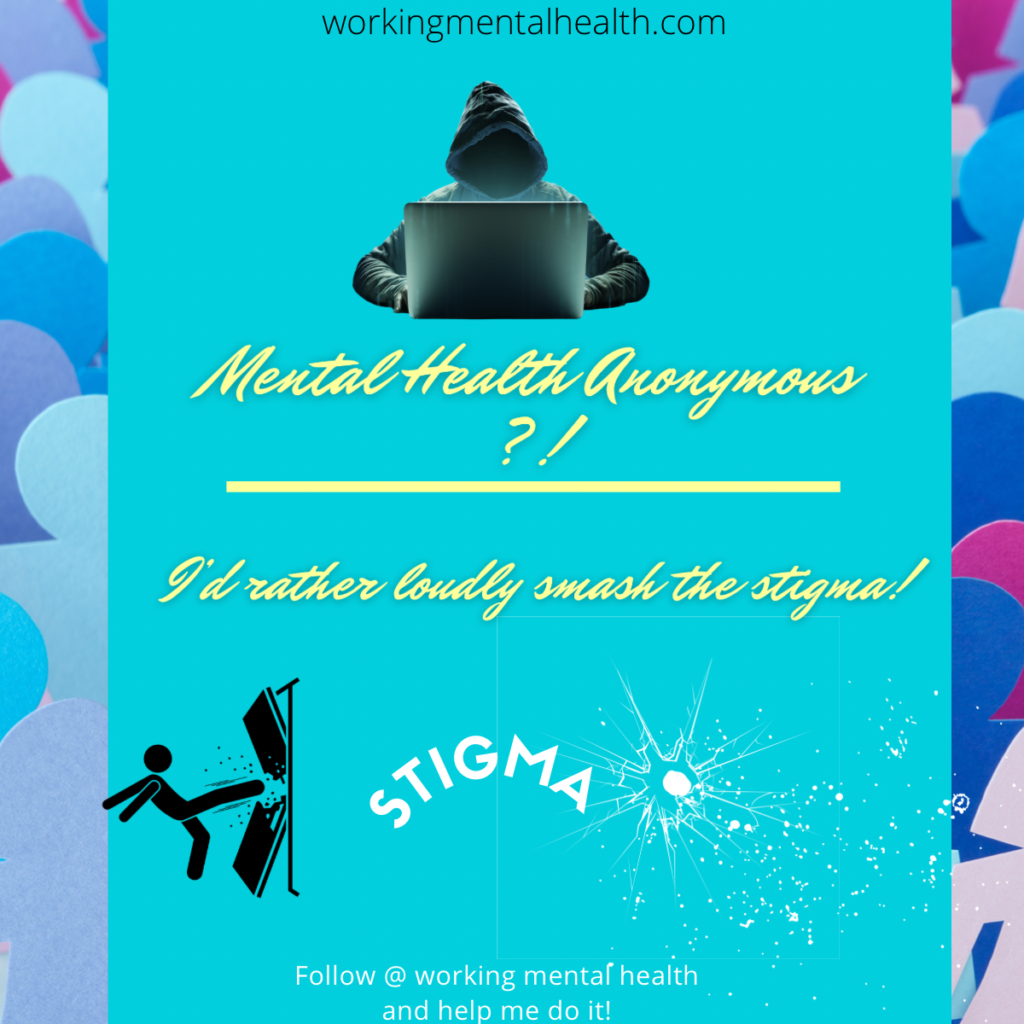Smashing the Stigma, Signing my Name
Why I Won’t Advocate for Mental Health Anonymously
My dad has has many concerns about my choices to loudly advocate for mental health the way I do, especially on LinkedIn. Recently, he suggested that I stop making posts from my personal page and that I remove any links to Working Mental Health to me, so that people would not know the identity of the creator and author. He also recommended that I change the name of Working Mental Health to incorporate the word “anonymous.” Since my dad chose to broach the subject with me fully knowing my strong opposing standpoint, I did not grant him the privilege of the “cliff notes” response. I love my dad very much and don’t relish telling him “no.” But that’s exactly how the cliff notes for this story read. “No.” As you can imagine, I have a lot of reasons for refusing to attempt to anonymously start a workplace revolution around mental health.
Since so many people have made such suggestions — unfortunately most of them have done so without my dad’s benevolent intent — it’s time to have a discussion about taking such a reticent approach towards reducing the mental health stigma. Let’s take a look at an example of someone’s idea of “constructive” feedback that exemplifies an exceedingly negative opinion about my choices to publish my articles.
“Grow up loser, you’ll never get a job. What employer would hire a mentally ill candidate without the smarts not to broadcast their craziness?!”
Yes, the above is verbatim except I couldn’t help but modify SOME of the grammatical errors even though I didn’t make the mistakes. Though commentary like the above fails to serve me at all and differs immensely from my father’s words, my reasons to include such an egregious, rude reaction to my work:
1) because it unfortunately provides an accurate depiction of remarks I receive regularly, but MOST IMPORTANTLY
2)to display that both versions of this feedback oppose my message; they defeat the purpose of my “why,” my reason for my advocacy and the explanation for risking my reputation.
Although my dad made his point politely and the other example represents bullying, both pieces of feedback question my use of a public platform where professionals discuss career-related information, to discuss workplace mental health. It’s the “does this belong on LinkedIn?” commentary, though worded in two distinct ways. The feedback constitutes a warning against publishing my content because other attorneys, higher-ups in the legal field, employers, everyone can see it. As my dad put it, “like it or not, employers definitely will judge you on that and be reluctant to consider you.” Or as others so colorfully remind me, I’ll “look like an unemployable lunatic for all my dream bosses to see.”
When I bring attention to rude reactions to my work, some of my followers suggest that I ignore them instead. Some even suggest the same for people who provide me the same type of advice but with approaches that resemble my dad’s approach. Although I admittedly do mention a myriad of the naysayers, I have reasons for that. Their words actually have had an unexpected effect on my work; the negative feedback has helped me in ways I never expected.
It has helped me establish a clear purpose for my work with Working Mental Health, something I’ve struggled to accomplish since starting the project. It has helped me definitely realize that even if I am taking risks by writing about mental health in the legal field, for me, the message is important enough to accept that and do it anyway. I’ve developed resilience that I never thought possible, and I apply it to my important, relevant to the workplace, appropriate for LinkedIn and wherever else I decide to broadcast it, message about smashing the stigma around mental health in the workplace.
To answer the questions presented in the feedback as simply as possible, I don’t see an effective way to anonymously renounce a dangerous stigma. I can’t effect the change I want and encourage people to have more open discussions about mental health if I don’t attach my own name to my message. I refuse to stop advocating for this important cause and I refuse to stop at just advocating. The next step is developing clear action steps, then taking that action to effect real change.
And as I write about my successful strides towards smashing the stigma, I will sign my name to every word.
by: Alyson Pi
January 12, 2021


